Are design graduates industry-ready?
Professionals assess the state of graduates and the industry.

Daily design news, reviews, how-tos and more, as picked by the editors.
You are now subscribed
Your newsletter sign-up was successful
Want to add more newsletters?

Five times a week
CreativeBloq
Your daily dose of creative inspiration: unmissable art, design and tech news, reviews, expert commentary and buying advice.

Once a week
By Design
The design newsletter from Creative Bloq, bringing you the latest news and inspiration from the worlds of graphic design, branding, typography and more.

Once a week
State of the Art
Our digital art newsletter is your go-to source for the latest news, trends, and inspiration from the worlds of art, illustration, 3D modelling, game design, animation, and beyond.

Seasonal (around events)
Brand Impact Awards
Make an impression. Sign up to learn more about this prestigious award scheme, which celebrates the best of branding.
Earlier this year, students up and down the country were gripped in a frenzy of degree show prep, tirelessly curating design portfolios and displays of their work to show the public – often in a bid to attract the attention of design magazines, creative studios or digital agencies on the hunt for the next big thing.
Instagram has been awash with colourful illustration and design emerging from degree shows and it’s encouraging to see how engaged students are with self-promotion. Of course, ‘likes’ does not a career make, and for many the stark reality of what comes next can be daunting.
Back in 2005, my degree show was just the beginning of an unorthodox career journey that saw me side-step into a variety of professions. For reasons I can’t fathom, professional practice wasn’t taught back then, and other than a vague meeting with the careers department, I left university with no more than a heavy A3 portfolio, a hideous overdraft and little idea of what to do next.
Thankfully, degree courses have changed considerably over the last 13 years, with a growing emphasis on entrepreneurship, studio visits and visiting lecturers on hand to deliver a taste of what is to come. Today’s grads are a lot more informed than they used to be, and for an industry that is constantly in flux this can only be a positive. But is it enough?
Thankfully degree courses have changed considerably over the last 13 years, with a growing emphasis on entrepreneurship
Lisa Hassell
A report by creative branding agency Michon released in April 2018 sought to highlight some of these issues, detailing concerns among the design community that recent graduates are leaving higher education with insufficient real-world skills. So where does the responsibility for this lie? Should studios take a more active role in further education? Or do universities need to engage with studios in a more collaborative way to make their classes relevant?
According to the Michon report, the creative industries contributed a record £92 billion to the economy in 2017 and this upward trend is only set to continue. The report also states that as part of the Creative Industries Clusters programme, the UK Government has pledged £80 million to help businesses and universities work more closely together, promoting collaborative research and creating highly skilled jobs.
This is an encouraging move, but there is still a great deal to be done to address the disparity between education and industry in order to equip students with the attitude and mindset they need to succeed. Is it time for an industry wide rethink?
Daily design news, reviews, how-tos and more, as picked by the editors.
Experience vs education
Tensions often arise from employers wanting real-world experience and undervaluing the important fundamentals that a practice-led art education is often structured around, observes Manchester-based designer Craig Oldham.
"I think education can make students more aware of certain practicalities of working life, but to nail it down would be misplaced time. They’d be better placed focusing on creative thinking and expressing that using their skills, [as] opposed to getting laboured down in bureaucratic practicality.
"For me I think there’s often an over-reliance from the industry on people being able to do these things, and I think we can often lose sight of the fact that we sell creativity as an industry – so that’s of primary importance to me."
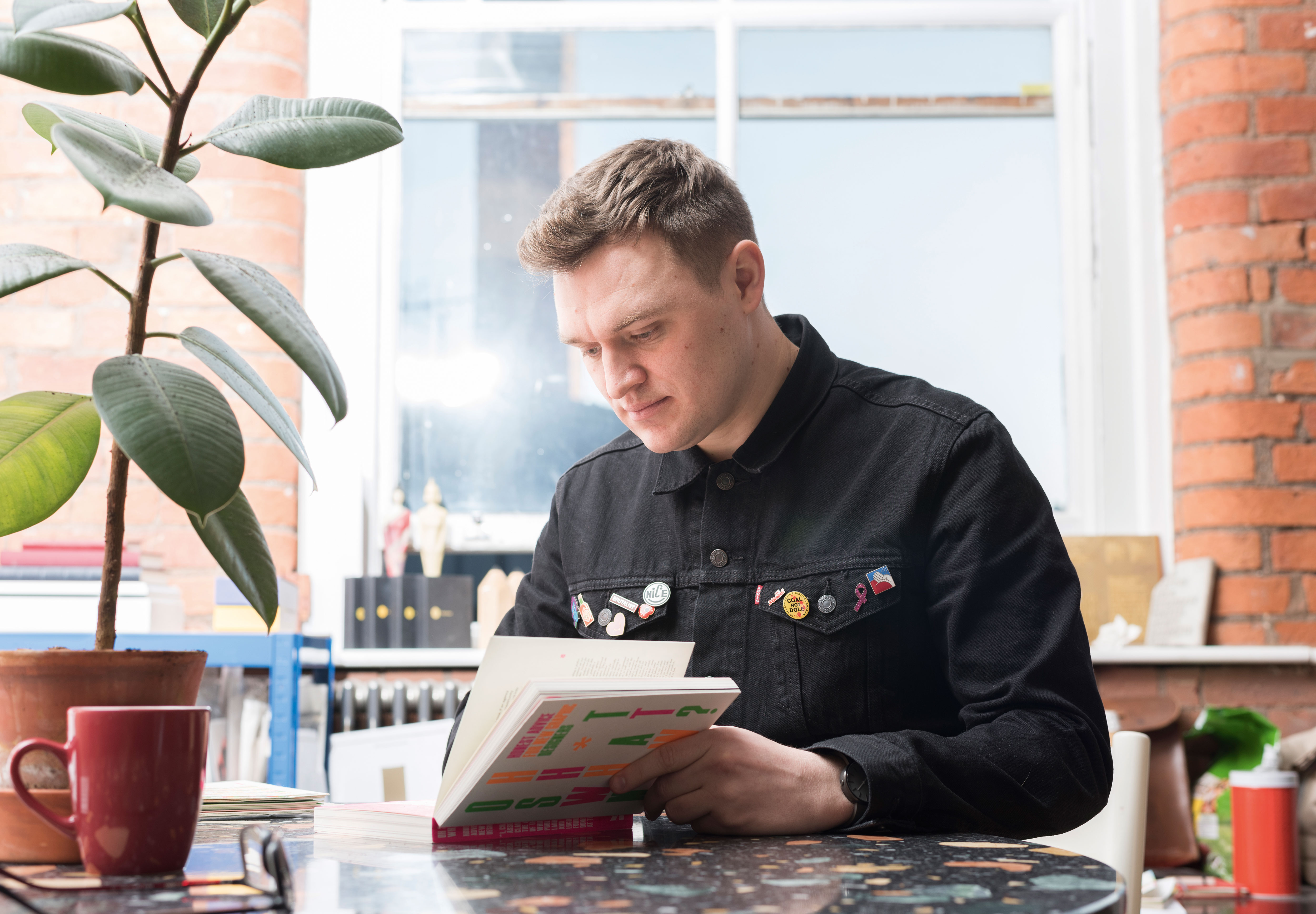
Producing design work for film, TV, retail, publishing, sports and entertainment, Oldham’s work has been recognised nationally and internationally by D&AD, the Creative Review Annual, Art Directors Club, New York Festivals, Design Week, Benchmark Awards, Big Chip Awards, Fresh, and The Drum Awards to name just a few. Oldham has also been named by his peers in the creative industry as one of the most influential designers working in the UK.
"I hate the bun fight that happens between education and industry, with both sides blaming one another," states Oldham. "It's pointless and futile, and each has to bear responsibility and engage in a meaningful dialogue and relationship. We are crippled now by numerous problems in both education and industry – gender, pay, race, class – and both sides have to take an active role in addressing them."
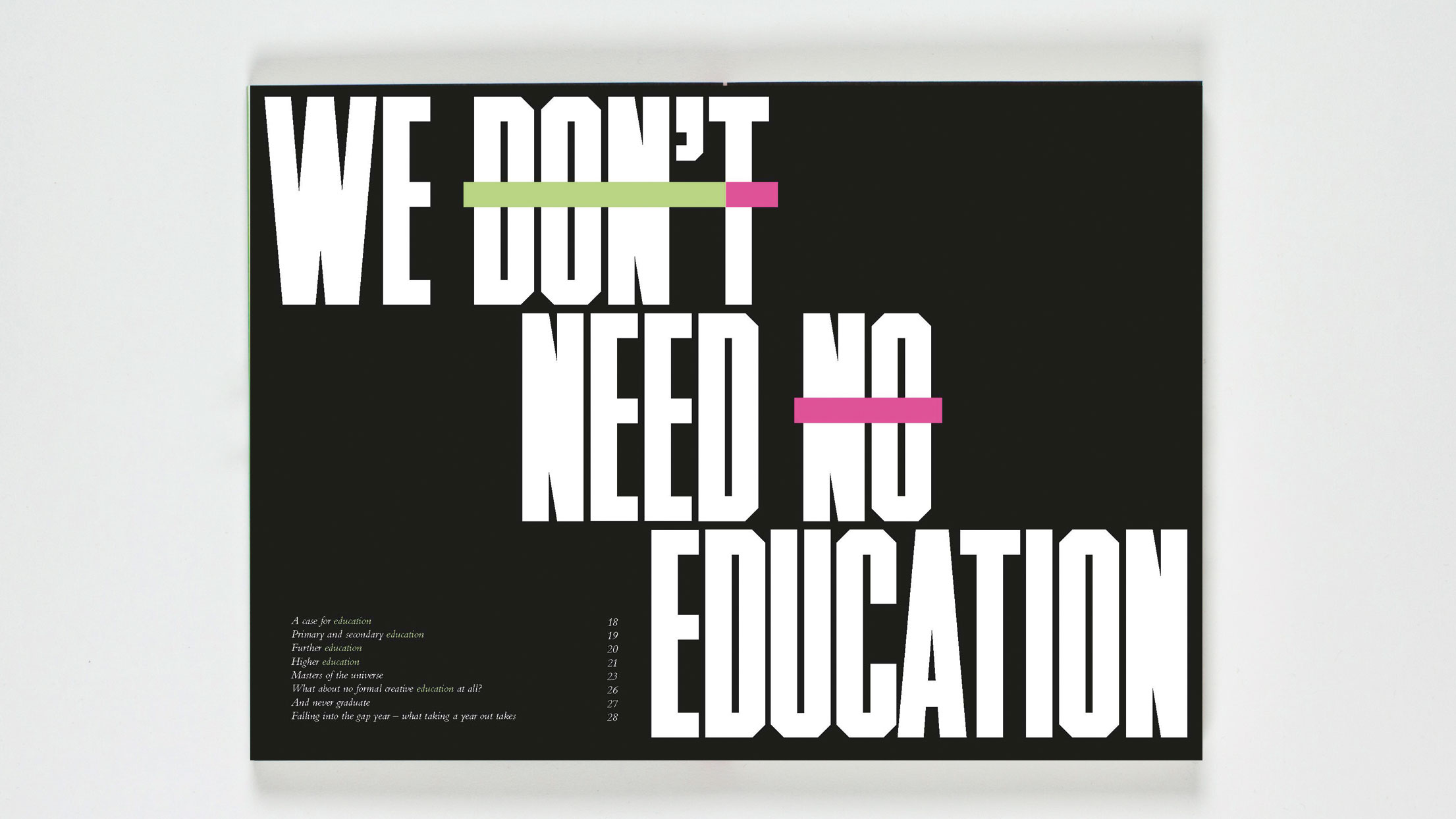
Building stronger partnerships between creative agencies and institutions from the off could be one route to structured training opportunities that benefit businesses, students and universities, but whose responsibility is it to bring in these changes?
Fuelling the debate, course leader at Ravensbourne University, Derek Yates, is frustrated with how some institutions are failing to tackle the issue. "Education has been a bit lazy in the way it works with industry," states Yates. "We need to develop our relationships more strategically. I've done a lot of industry projects over the years and the ones that work are where both parties get something out of it. Both parties have to benefit for the relationship to work."
Collaborate to drive change
At Ravensbourne University, Yates has developed approaches to working with the industry. In 2012, he initiated and chaired Alt/Shift, a platform to promote meaningful dialogue and constructive collaboration between the creative industries and design education.
Over the next 12 months, Alt/Shift facilitated a conversation between creative practitioners and educators from across the UK online via a blog and website, on Twitter and as part of two discussion events hosted by leading digital agencies.
Heading up the BA Hons Advertising & Brand Design course, a major part of his role involves facilitating partnerships between education and contemporary creative practice, and over the last 10 years he has instigated projects with internationally recognised organisations such as the O2, Eye Magazine, LBi, Moving Brands, Mother, National Air Traffic Control, De La Rue and ustwo. Earlier this year he broke new ground with Untitled – a one-day networking event delivered in collaboration with Lecture in Progress.
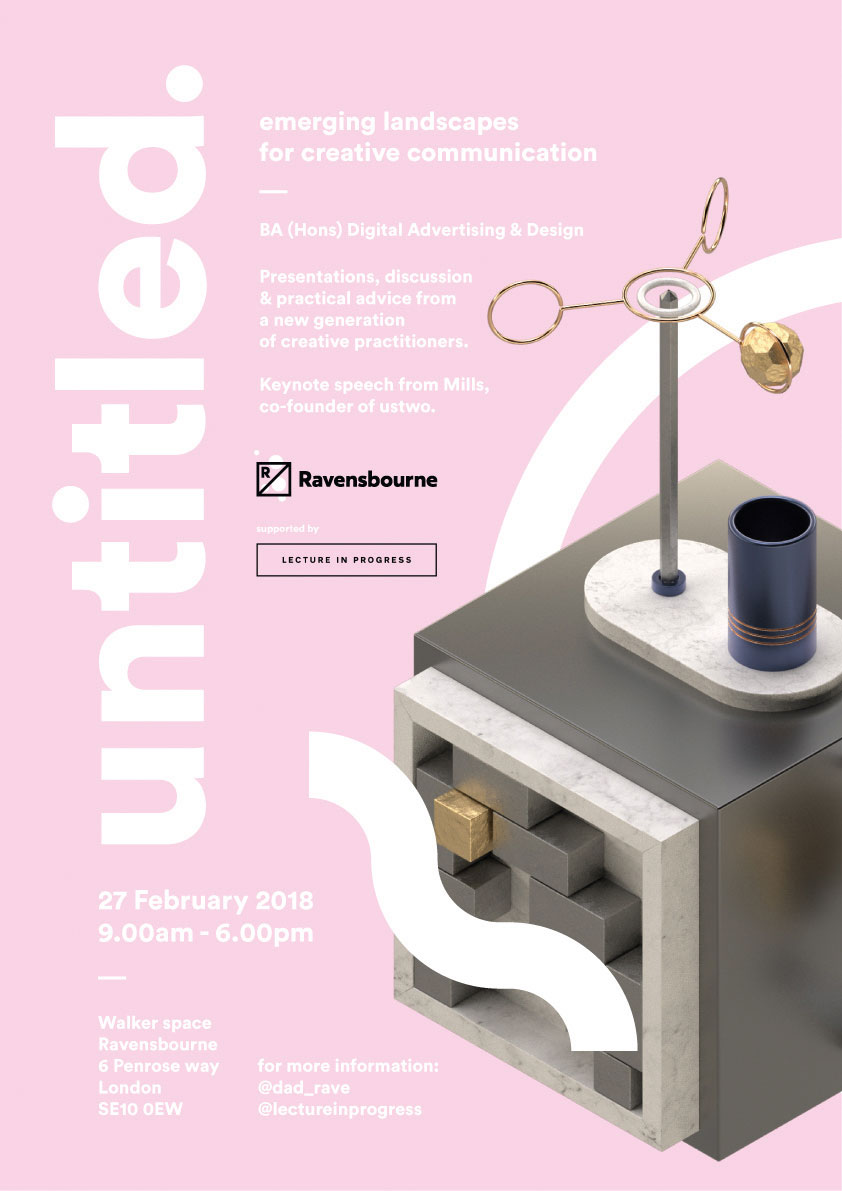
"Our aim is to empower emerging talent with information and first-hand accounts that demystify the day-to-day workings of the creative world," says Will Hudson, who ran a series of workshops with Ravensbourne students. "By focusing on the people, projects and places that make the industry thrive, we want to deliver greater visibility to how work unfolds, where it happens and the breadth of roles that exist."
Putting it to the students to define what they thought a conference could look like, Hudson and Yates worked closely with the group to brainstorm different ideas, and gradually a set of criteria emerged. "They didn't want a conference that was just lectures, they didn't want a conference that was delivered by white, middle-class men, and they didn't want a conference delivered by people over 30," reveals Yates. "And also, they were interested in unorthodox journeys."
Co-curating a one-day creative conference, Ravensbourne students set up an inspiring day of talks delivered by diverse up-and-coming creatives, followed by group discussions. "We ended up with eight amazing speakers all with incredible stories," says Yates proudly. "It felt like we tapped into really fertile ground."
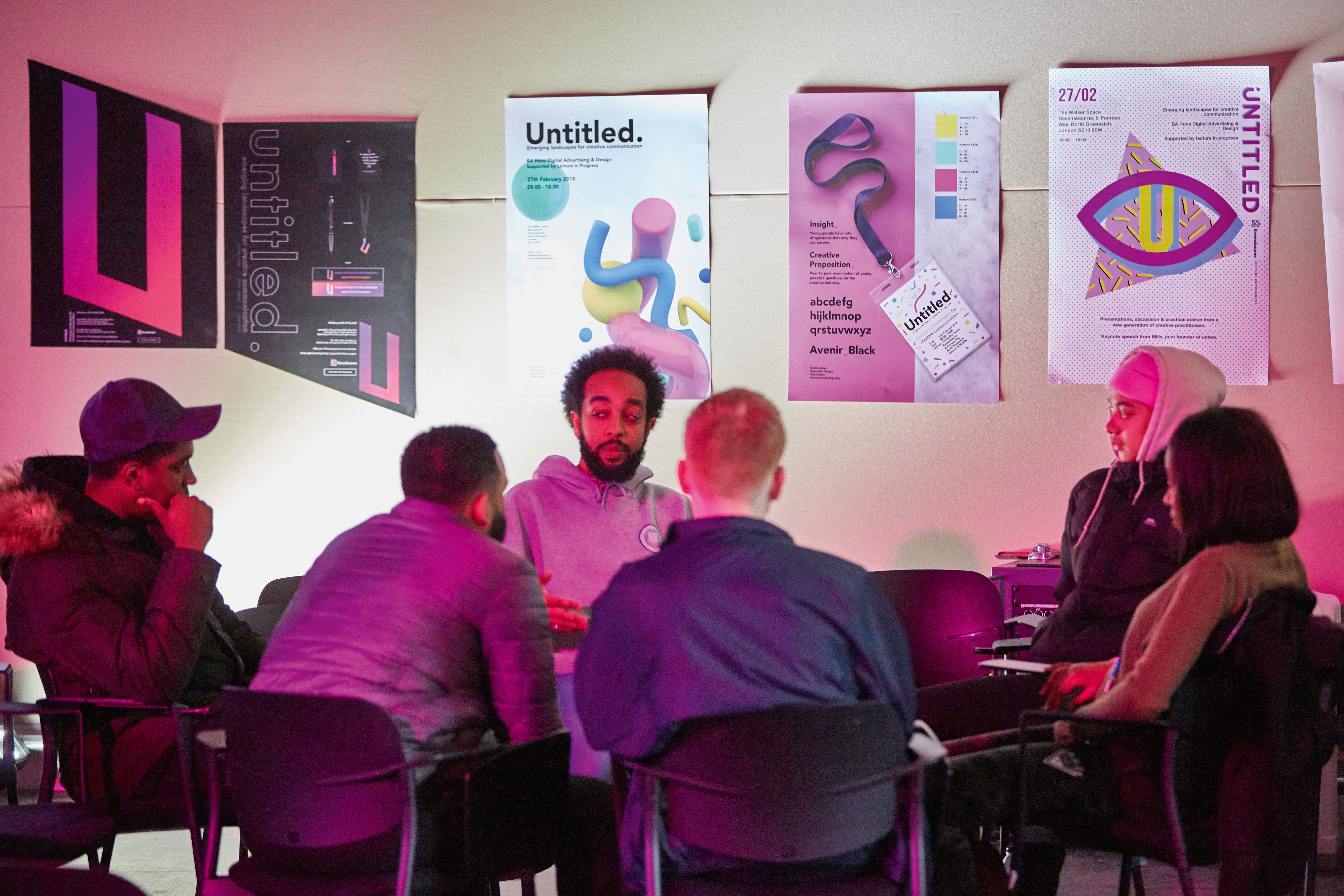
The branding and marketing of the Untitled conference was created by second-year students on the Advertising and Branding course at Ravensbourne, who pitched ideas to Hudson. The winning team (Tayo Onabule, Michael Bailey and Charlie Baker) implemented a strategy across multiple media channels and social media platforms.
Lecture in Progress is now in the process of building relationships with a number of universities across the country, recognising the need to build visibility up and down the UK. In the last year it has been to Winchester School of Art, University of Brighton, UCA Epsom, Edinburgh College of Art, Nottingham Trent and Plymouth College of Art. "One of the things that's really important when on campus is to understand from both the tutors and the students about the university experience," Yates adds.
Having observed that recent developments in higher education has led to environments where students are not trusted with the freedom to shape their own learning, Yates believes students need to be active participants in the way their education develops.
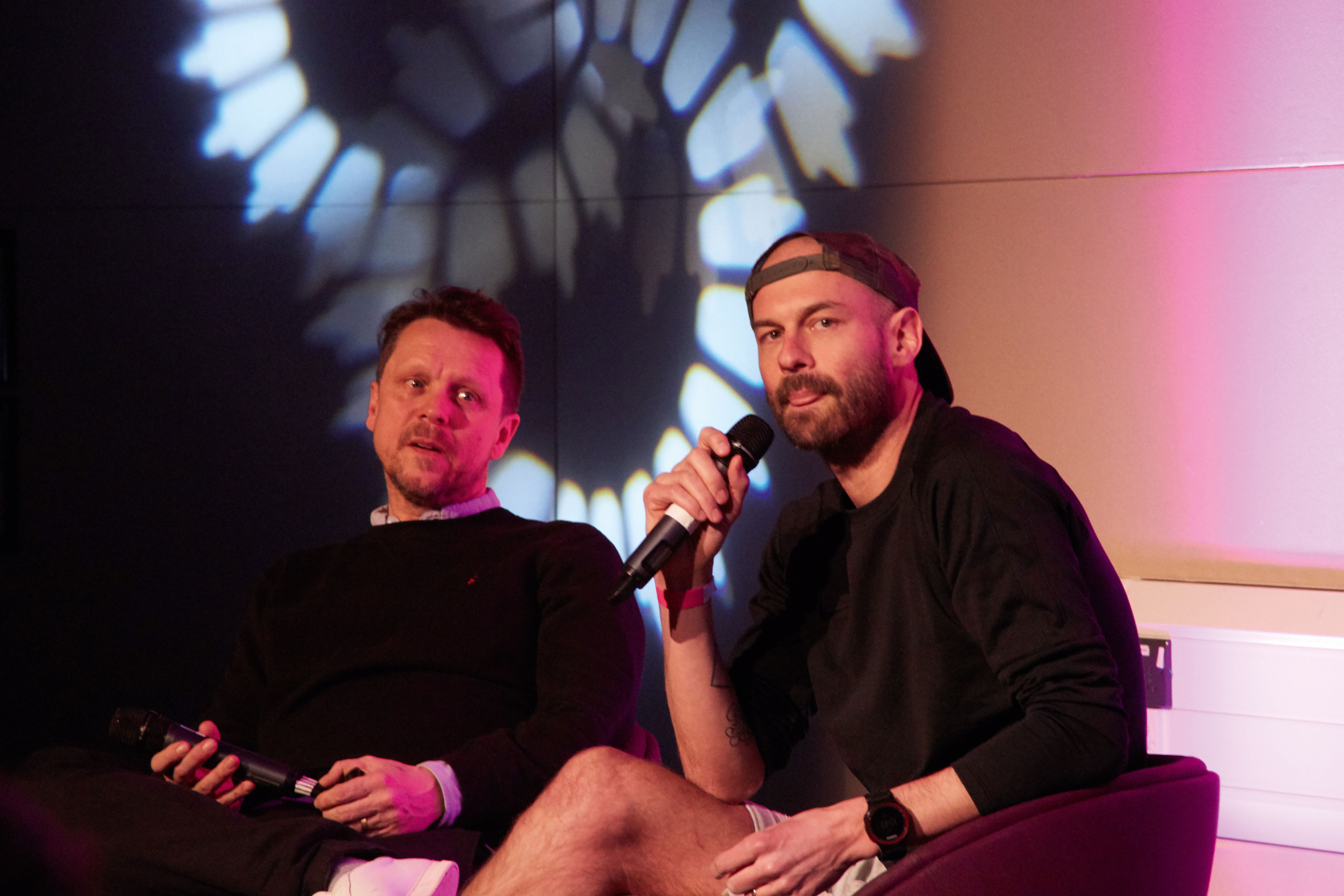
"There's an equally important conversation to be had between students and educators. If you give students more responsibility and ask them what they think they can quickly show you what you can do better. They need to question and discover for themselves and we need to incorporate what they are learning into how their course design develops year on year. We need to trust our students more."
"Working as part of an established institution has made me aware of the challenges that they face in terms of being agile," observes lecturer Alec Dudson. "It tends to mean that for the large part, further education is reactive rather than proactive, but at the end of the day, these are all now run as businesses. As such, the market will dictate how they evolve and if student intake drops, there'll be an industry-wide rethink."
I think all practitioners have a responsibility to teach, to give back
Craig Oldham
Designer and educator Oldham feels the industry has a responsibility to safeguard its future. Believing that education needs to be more diverse in who it teaches and for what purposes, Oldham suggests that the industry needs to continue to educate once people are working.
"I think all practitioners have a responsibility to teach, to give back, to expose those not in their position what it takes and undertakes," he says. "And I think students have a responsibility to engage themselves, set and answer questions and goals that they have thoroughly investigated."
University degree alternatives
Shillington ensures it is relevant to the creative industry by hiring only practising designers who are personable, eager to mentor and share their knowledge with the next generation. "Their expertise guides our curriculum, and their experience allows us to cultivate an authentic 'studio' classroom," explains UK Director Sarah McHugh. "Intensive courses are definitely shaking up education, and we're proud to be one of the original pioneers."
Eleanor Robertson parted from a career in marketing and publicity to pursue her passion for design, enrolling on the full-time course at Shillington. Within a few months of graduating she secured a junior designer role at branding agency Paul Belford Ltd and hasn’t looked back.
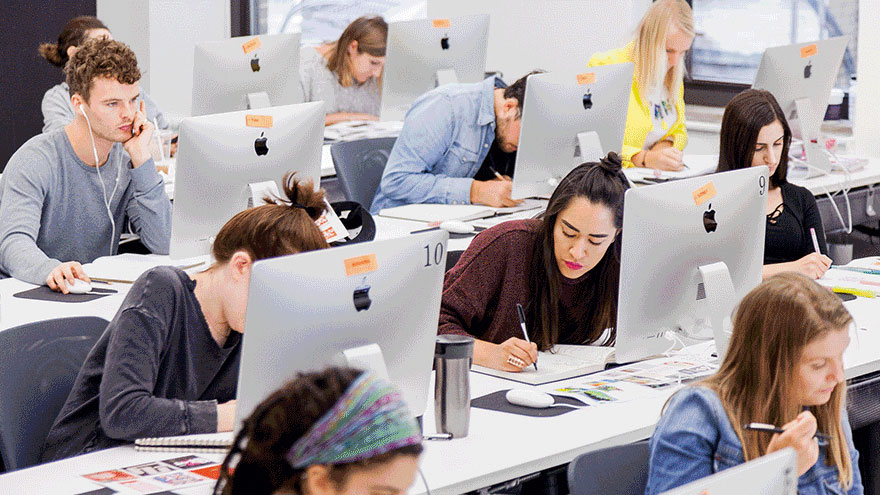
"One of the things that I enjoyed most about the course was the diversity of the students and the variety of their backgrounds, from fine art and furniture making to law and nutrition," Robertson reveals. "These different experiences meant that people's responses to the same brief were wildly different, which was very inspiring."
In today's fast-paced world, it's entirely possible that university and intensive courses can actually work really well together, as McHugh attests: "many of our students have already completed degrees and/or worked in a wide variety of industries. Their previous experience and skills can actually benefit them at Shillington to up-skill or completely change their careers."
Different experiences meant that people's responses to the same brief were wildly different
Eleanor Robertson
While not necessarily a comparable alternative to a university degree, Shillington has popularised short courses and industry training for those looking to enter the design industry, and it's an interesting avenue worthy of further exploration. "Shillington serves a different market, offers an interesting alternative and has a pretty damn impressive record when it comes to its graduates getting employed as full-time professional designers," says Dudson.
“University has a lot to offer, but obviously it's a huge financial commitment. As long as universities aren't complacent and are mindful of the evolving needs of their students, I don't think they'll become redundant, though."
Creating opportunities for students
Launching Intern with the goal of making the creative industries more diverse, representative and inclusive, Dudson is passionate about providing opportunities to the next generation of creatives.
"I started the project to provide a place where an open dialogue about creative careers could happen, as I was seeing far too many people either trapped in a cycle of unpaid internships, or locked out of potential careers because they simply couldn’t afford to keep working for free."
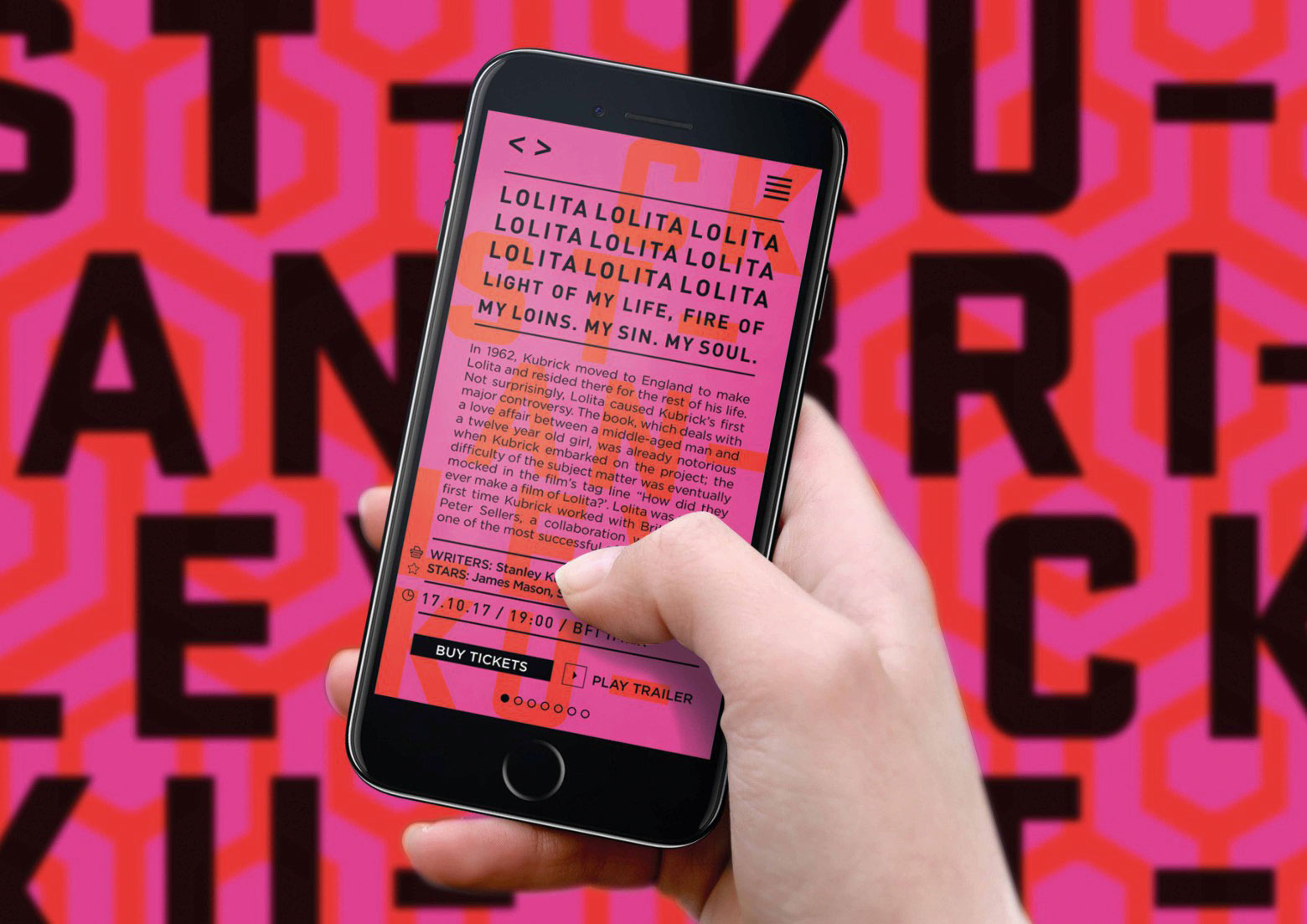
Joining the teaching staff at Leeds Arts University last year, Dudson was tasked with refreshing the professional practice module for the final year graphic design students. "Broadly speaking, my aim is to make students understand that there is no substitute for real client work and building genuine, exciting, multidisciplinary networks," he says.
"I see a lot of positive, energetic and innovative approaches to ensuring that students are industry relevant, but this isn't something you can ever be content with as an institution."

Dudson has plans for a series of after-school or summer school programmes under the Intern brand, which focus on the professional practice element of the creative skillset.
"There's a huge ecosystem of jobs in the creative industries around the assumed core of graphic design, photography and illustration. We absolutely should be encouraging students to explore these roles; universities and industry need to have a clear, transparent dialogue about the less glamorous roles," he says.
Valuing creative ideas
Nick Young heads up the Creative Advertising course at Leeds Arts University, focusing on the fundamentals of advertising. "We talk to them about the roles there are in an agency and let them find their own way. Most of them decide to be art directors or copywriters. Some become designers and some even go into strategy or client services. The ethos of our course is 'Ideas that work'."
Third year students at Leeds, Ryan Morgan and Charlotte Bailey, secured a work placement at McCann Manchester. "We were thrown onto an ALDI brief immediately and quickly got a taste of what it was really like to work for a large, well respected agency," says Bailey.
Technical skills are easy to pick up. But thinking of ideas is hard.
Nick Young
"At one point we ended up working our weekend on placement, which gave us insight into the reality of this industry," adds Morgan. "Everyone is so driven and committed and their priority is nailing the brief for the client, not because they're forced to but because they love it. It was really inspiring to be part of an environment full of talented and motivated people."
Organised visits to agencies such as Mother, Ogilvy and Wieden+Kennedy are vital to the success of the course. "The best part about these visits is that you get to see inside a real agency and the hustle and bustle of it all," enthuses Bailey. "It inspires us to strive for opportunities; it's now our ultimate dream to work in New York."
Riding high at the top of the Guardian League Table, Leeds Arts University has a reputation for delivering industry-savvy graduates, with an emphasis on studio visits, placements, industry speakers and live briefs. "We teach them how to think creatively," says Young. "Technical skills are easy to pick up. But thinking of ideas is hard. If you can come up with good ideas on demand, you will always be useful."
Nurturing the next generation
"Agencies need to understand with real sincerity the level of the person they are looking to engage with, what responsibilities they can delegate, and be realistic about how that fits into their working schedule," argues Oldham.
"It's no use if they just want someone to come in and be a dogsbody, and then whinge because they require more investment in time than another experienced designer may – what do they expect?! Equally on the other side, the person coming in needs to understand they have to learn, they have to be patient, they have to be committed."
Neil Bennett, strategy director at LOVE, recognises that there are many benefits to the gig economy if you are a creative; "Variety, lifestyle control, chance to work on personal projects and if you are very good it can be lucrative."

Bennett's role is about "connecting the dots between a client's business challenges, culture, and consumer insight; to help inspire and support the creation of the very best and effective creative work. But to make it work you need a combination of experience and something unique in your armoury – often this is a distinct style or craft."
Education and industry are two separate things; nobody graduates from a degree in medicine and goes into surgery on day one.
Will Hudson
Hudson agrees, offering reassurance that nobody is expecting grads to be the finished article straight out of school. "I strongly believe the role of a studio is to help develop emerging talent. Education and industry are two separate things; nobody graduates from a degree in medicine and goes into surgery on day one."
Employing a team of 31 full-time staff across It's Nice That, Anyways and Lecture in Progress, the HudsonBec Group offers a number of entry-level 10-week roles across editorial and creative, but admits it had to make changes. "We drew the line about five years ago where we changed the language around internship to junior freelance," says Hudson.
Initially offered at National Minimum Wage, these roles are now paid at London Living Wage, which has led to a number of freelance roles joining the team full time, with around six of the current full-time staff coming through this process. "It has given us the opportunity to bring in a number of people over the years, often right at the start of their careers," reflects Hudson.
"There is obviously a baseline skill level and competency relevant to any role, but we have always maintained we are looking for passionate young people, willing to learn, contribute to conversations, aware of the industry and world around them."
For the lucky few that secure design jobs straight off the bat, there are hundreds who don't. Weeks can quickly turn into months as the job hunt labours on, and the pressure to earn money can weigh heavily on the shoulders of many. With the number of grads outnumbering demand from the industry year on year, taking a seemingly unrelated job could still work to your advantage in the short term.
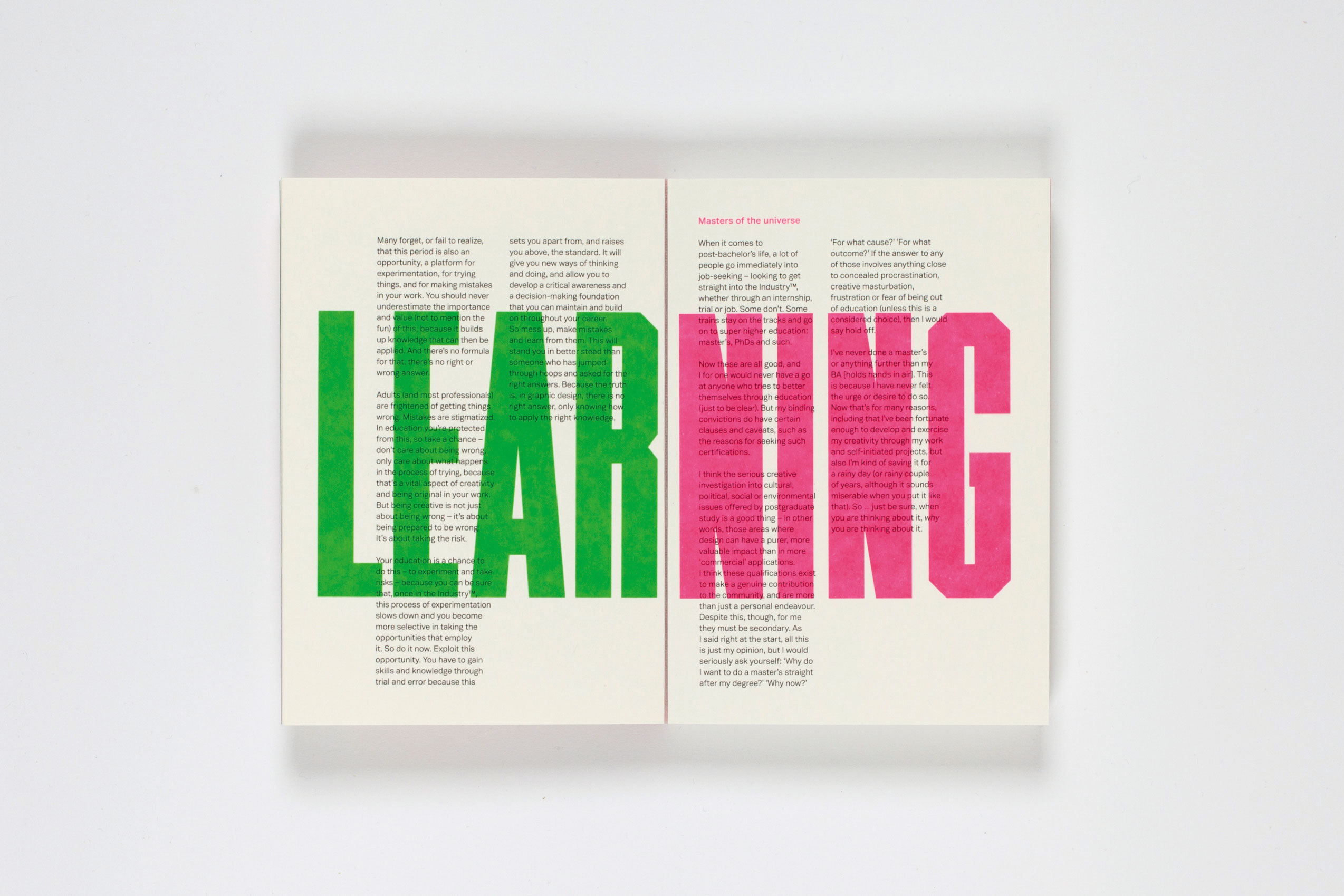
"With every project, job, client, experience, there is always something of value to take from it," says Oldham. "I think it's important for every person to evaluate as much as they can on the outset of undertaking anything – what they want to get from it as an aim, and what they will definitely get from it as a reality."
Having an idea of what you are doing something for, and why, beyond earning money can save a lot of pain down the line, or equally adds to the joy when things turn out better. "There can always be something you can take from any situation, be that a shit one or a great one", says Oldham.
"My partner used to work in a shop while looking for work – but she saw this as an opportunity to write, get her new ideas out and her existing ideas developed. I'm not saying it's not hard – it is – but I feel there's always a hope and it's that which you've got to hang on to and work towards. But make it your own 'hope' not someone else's."
Designing courses fit for the future
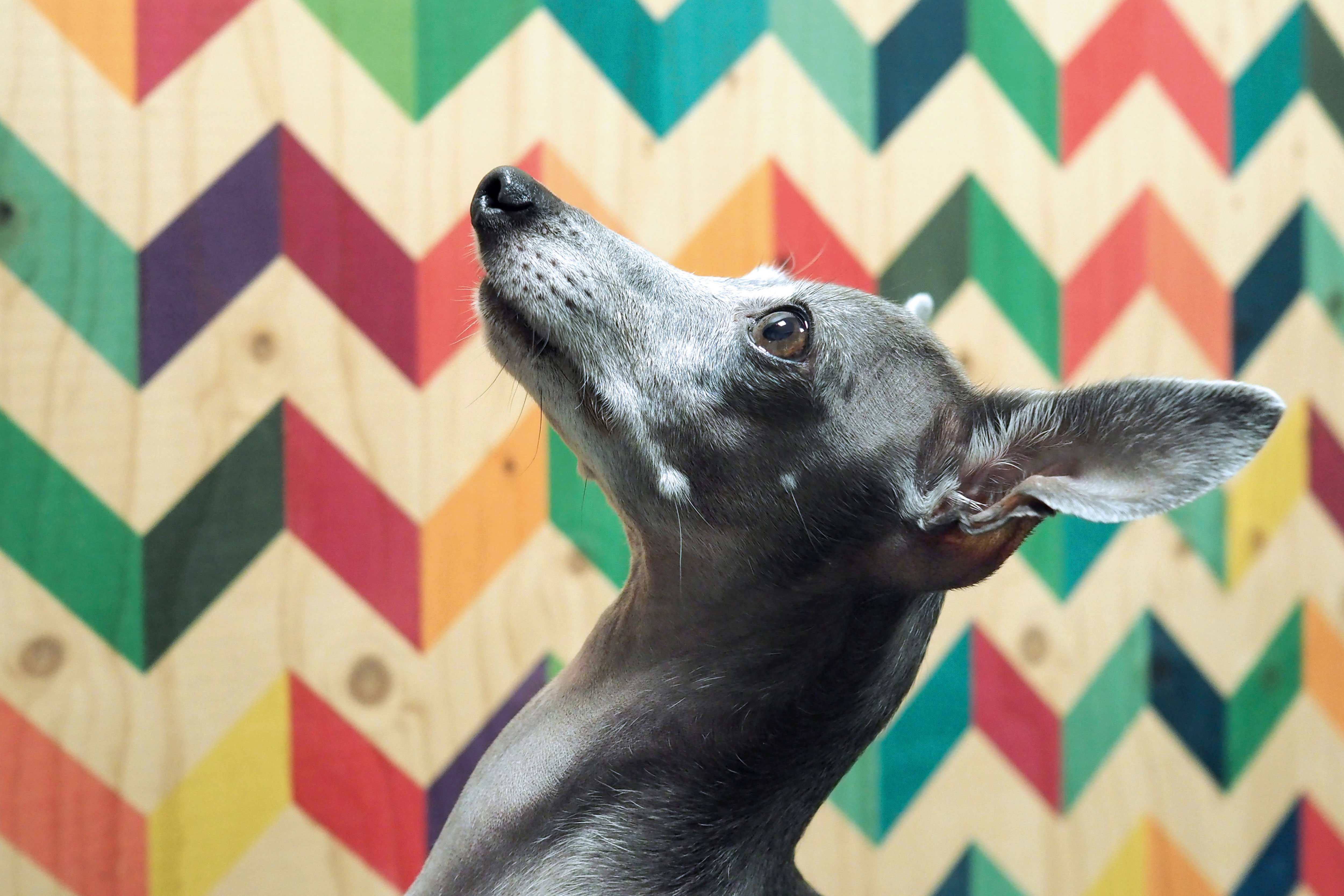
Designer and educator Jenny Theolin creates and delivers learning experiences for individuals, schools and businesses within areas such as technology, design thinking, creativity, innovation and entrepreneurship.
Previously a teacher at Shillington and programme leader for Hyper Island’s MA in Digital Management in London and Stockholm, she now designs courses, programmes and workshops for Hyper Island Business, Berghs School of Communication as well as her own studio clients, helping individuals and organisations learn, grow and lead in a changing world.
Designing a course called The Studio for the Digital Media Creative Programme at Hyper Island, Theolin teaches client relations, building teams and project management.
“During six weeks the 50-plus students get to build their own studios and are assigned two real clients per studio to deliver on. Right in the middle, they have to drop everything and enter a 72-hour hack."
The industry is very small, and it is much better to create long-lasting friendships than short-term dates.
Jenny Theolin
Like Yates, Theolin recognises the value of aligning courses with industry, to ensure students develop the flexibility and empathy needed to work with people. "Graphic design is a people's business," she continues, "you need to learn people skills and build relationships. The industry is very small, and it is much better to create long-lasting friendships than short-term dates."
Using research to develop
Building connections with studios such as ustwo, Sennep and Moving Brands, all of whom have set up research initiatives to ensure their commercial work is constantly evolving, Ravensbourne is able to feed insights from this into the development of its courses.
“ustwo has a games division and a ventures floor, Sennep is also developing games and has an experimental lab creating Sennep Seeds, and Moving Brands has set up Gobi and Moving World," reveals Yates. "If you look at what they're doing, it's research. They are looking for ways to unearth new knowledge. Research is a necessary part of how our industry is developing."
Yates suggests this could drive new opportunities for research related specifically to the creative disciplines. "I've always felt education needs to respond to its context," concludes Yates. "It needs to change and keep changing, because the world around it keeps on changing."
Lead image by Nate Kitch
This article was originally published in Computer Arts, the world's best-selling design magazine. Buy issue 281 or subscribe.
Related articles:
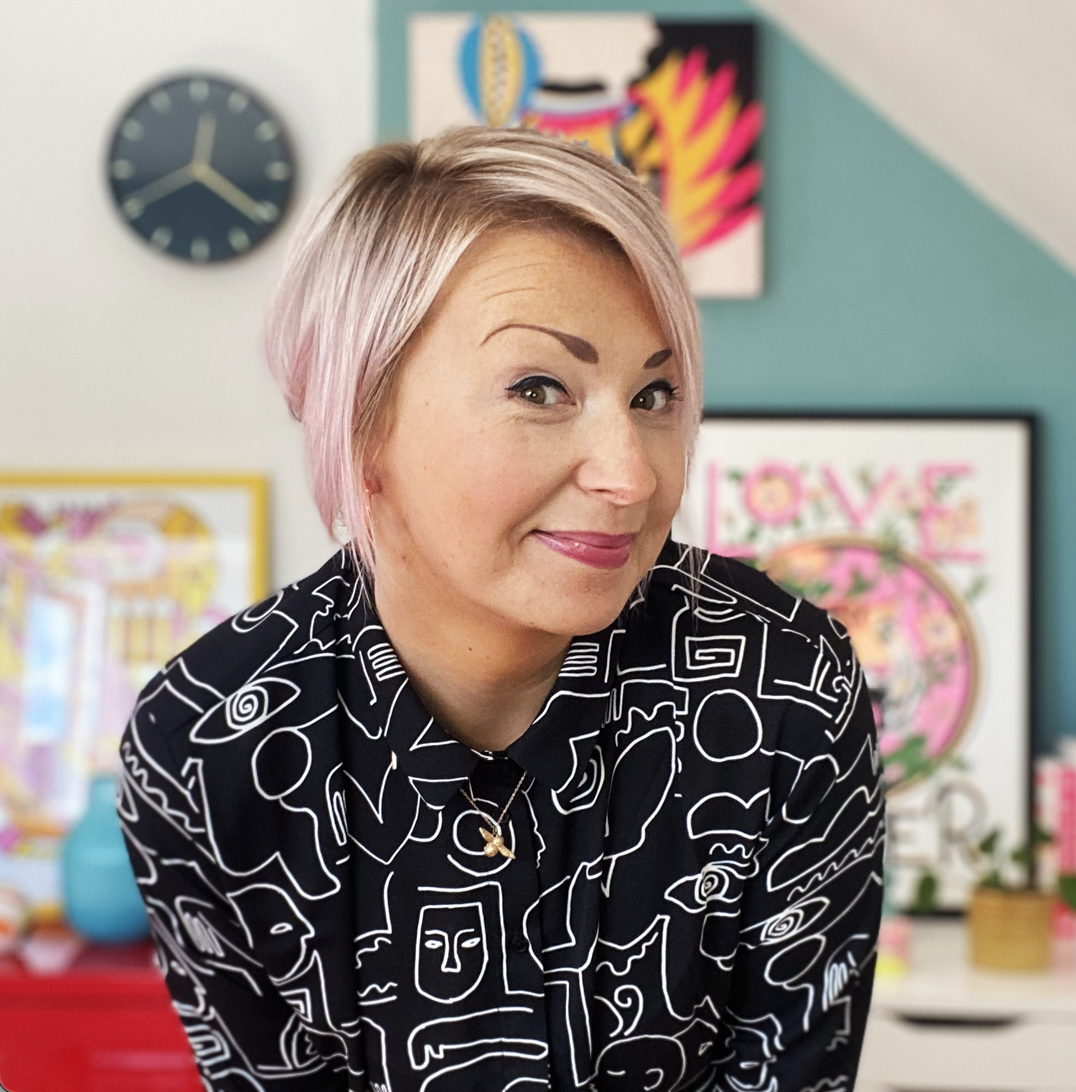
Lisa Hassell is a creative coach and the founder of Inkygoodness – a global community on a mission to connect, inspire, and empower the next generation of artists, illustrators and creative entrepreneurs.
